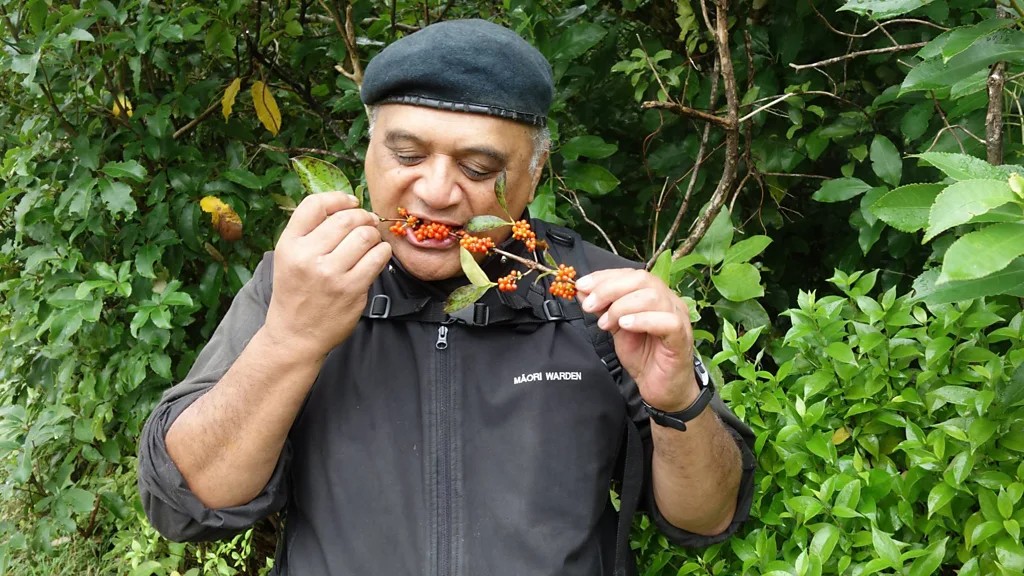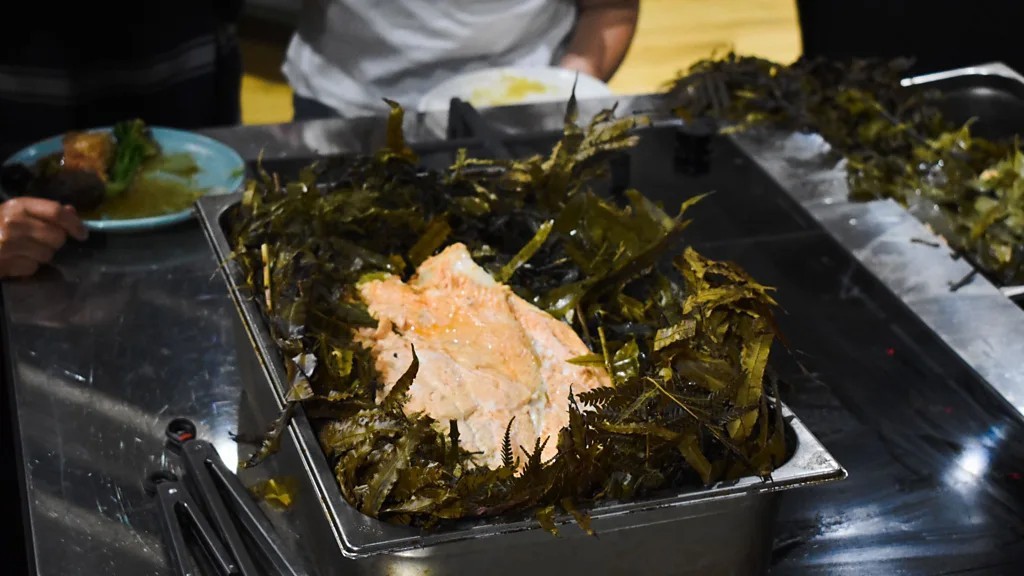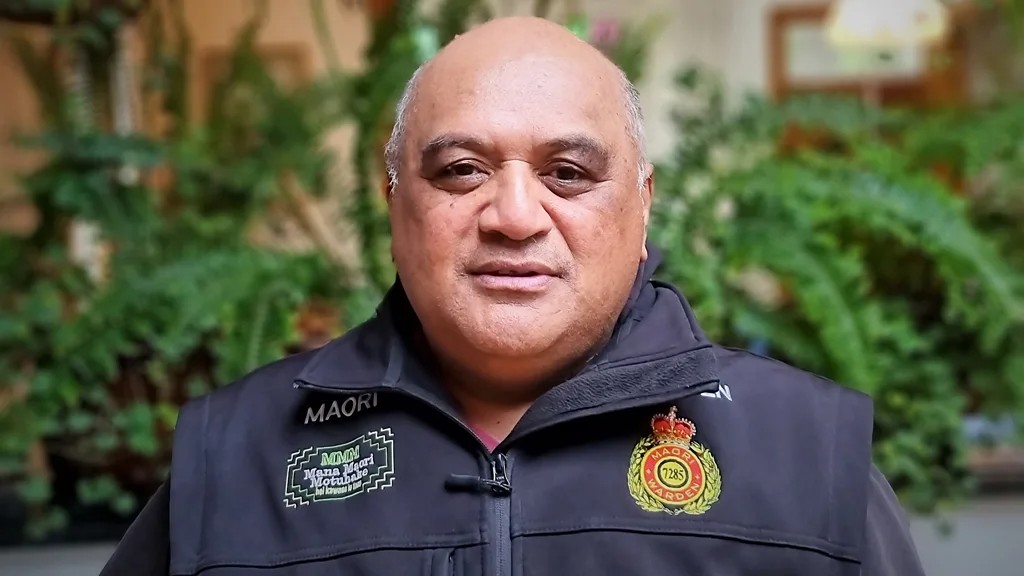by Alexia Santamaria | 30 September 2022.
Joe McLeod is part of a small movement of Māori chefs who are finding modern and creative ways to pass traditional Māori food onto future generations.
On any night in Auckland, you can have your pick of world cuisine, whether you're hankering for hand-pulled biang biang noodles swathed in chilli oil, or a Margherita pizza cooked by someone holding official Associazione Verace Pizza Napoletana certification.
But what about New Zealand's traditional cuisine? That's not quite so easy to find.
Māori, the first inhabitants of New Zealand, were thought to have arrived sometime in the 1300s by canoe from East Polynesia (though the exact date of their arrival is still debated). Their original diet was largely foraged food such as wild ferns, vines, palms, fungi, fruit and seeds, plus root crops like yams and sweet potatoes from their homeland – as well as hunted birds and seafood. But despite nearly 17% of New Zealand’s population identifying as Māori, indigenous cuisine is not widely available.
There are many varied and complicated reasons for this, including the urban drift of Māori from a more traditional way of life into the cities; the ongoing effects of colonisation; and the rise of convenience food.
Visitors may still find some elements of traditional food within Māori communities (and in some tourist spots) – mainly dishes like rewena paraoa (potato bread), boil up (simmered pork bones, root vegetables and watercress served with doughboys) and hāngī (meat and vegetables traditionally cooked underground on hot rocks) – but it has definitely taken a back seat to more English-influenced fare over the last two centuries.
|
|
Now there's a small movement of Māori chefs determined to make sure traditional indigenous culinary knowledge does not get relegated to the history books, and they are finding modern and creative ways to pass it on to future generations. One of them is Joe McLeod, a New Zealand chef who has worked for 50 years in 35 different countries but has now returned to his roots. He's making it his life's mission to document and pass on what he learned growing up, teaching it to as many people as he can to keep this important part of New Zealand's indigenous culture alive. While most of McLeod's culinary career has been at the fine-dining end of the scale (he was the first Māori to hold the position of executive chef in the New Zealand parliament, and has worked at the Ritz in London where he cooked for the Queen and many celebrities), his early years were filled with a different type of cuisine, largely comprised of hunted and foraged food. |
He grew up in the remote Te Urewera National Park, and his iwi (tribe) of Tamakaimoana is a private iwi within the larger and better known Tūhoe tribe. For McLeod's family, food – and the methods of acquiring it – were not much removed from the ways of the first Māori in Aotearoa (New Zealand).
Underpinning traditional Māori life is a communal philosophy that includes the sharing of food. "The bush was our pantry," he said. "We ate fish, birds, rats, possums, pork, venison; we cooked in our houses but also over open fires and hāngī-style. The only ingredients we ever got from a store were things like flour, butter and sugar."
"As kids, we even had to weave our own flax plates to eat from every day for lunch. If you didn't make your own raurau you didn't eat!" he laughed. "Real plates were only for guests."
The bush was also their hardware store and pharmacy. "I thought it was normal to know you could eat parts of the cabbage tree when food was scarce, but also use it to build houses, palisades, canoe joints, fishing lines and nets or as medicine for children with colic or on cuts and bruises," he added.
That very traditional lifestyle has now almost entirely disappeared, and there are some challenges in bringing the culinary part of it back. According to Dr Jessica Hutchings, a multi-disciplinary researcher in environmental studies, Māori studies and kaupapa Māori (Māori ideology), "It's all part of ongoing settler colonialism in New Zealand. Because of the Wildlife Act, we have to apply to the Crown to harvest anything because it's all part of conservation estates, yet it's the area where all of our food basket is. We are so disconnected and displaced from our original food systems and our native ingredients."
It's undoubtedly a complicated culinary situation, and McLeod is equally bothered by these legislative barriers. But his focus right now is to make sure at least the knowledge is preserved – and imparted in whatever ways he can. When McLeod talks to his nephews and nieces now, he realises how much knowledge has been lost. "They don't know you can cook part of the mamaku plant and use it as a starchy carbohydrate like potato, or that miro berries go beautifully with chicken or pigeon and can be used to make a delicious energy-giving drink," he said.
 |
McLeod learned all this and more from his mother, who learned from her father and he from generations and generations before. "It can't stop with me," he said. "I have to preserve this knowledge for future generations."
|
And that's what he's doing, in a raft of different ways. He's currently engaged in a master's degree, followed by a PhD – the drive of his study being "to protect New Zealand's culinary culture and make it available to all New Zealanders". He's also working with marae (traditional Māori meeting places) to educate and reconnect these tribal groups with their traditional cuisine. He currently holds the Māori Ambassador role for the New Zealand Chefs Association and gives cooking demonstrations for those who wish to learn, such as the national food writers association (Food Writers NZ) and other interested groups. He also recently cooked traditional hangis with modern flavour twists for Matariki (Maori New Year) at a number of public events all over the country.
While he doesn't have his own restaurant, visitors can taste a little of the knowledge he's passed on in places like Hiakai in Wellington, which is helmed by Monique Fiso (of Samoan Māori descent). Fiso is one of New Zealand's most talked-about chefs and her restaurant is devoted to the exploration and development of Māori cooking techniques and ingredients (it was named Antipodes Best Specialist Restaurant in the 2021/22 Cuisine Good Food Awards).
Fiso, who starred in Netflix's The Final Table and alongside chef Gordon Ramsay on National Geographic's Uncharted, spent hours with McLeod foraging in the bush and being introduced to many of the 16,000 edible flora and fauna and how to cook them. She's gone on to incorporate some of this knowledge into her menu at Hiakai, which has showcased dishes like eel with watercress, kina (sea urchin) panna cotta, roasted tītī (mutton bird), plus elements and adornments like pickled pikopiko (the curled fronds of a native fern) and harakeke (New Zealand flax) hummus, and kawakawa berries as part of dessert.
|
McLeod also recently taught his first class at Homeland, a cooking school and restaurant owned by one of New Zealand's most internationally recognised chefs, Peter Gordon, where he delighted participants with dishes such as fish wrapped in rangiora leaves and steamed in bracken fern (seafood has always been a huge part of the traditional Māori diet). Karena and Kasey Bird, two well-known culinary personalities, also with a huge interest in showcasing indigenous food, believe what McLeod is doing is crucial for their culture's preservation. "His knowledge around Māori kai is second to none. His PhD is going to be so invaluable for future generations and also links us back to the importance of our whakapapa (ancestry) and history on this land," said Kasey. McLeod certainly hopes so. "Colonialism brought a detachment from our culture and heritage that was brutal, and generations of Māori were severed from their reality," he said. "The Crown tried to 'civilise' Māori, and in doing this, separated us from our cultural habitat and heritage, but we can bring it back." "Maori cuisine is so totally unique, and completely organic. My dream is [for] Māori to be proud of who they are, and what they cook once more – and share that with all of New Zealand, as well as anyone who visits our beautiful country." |
 |
Maybe one day people will visit New Zealand and be able to easily find dishes creatively using ingredients like kina, paua (abalone) eel and muttonbird just as easily as fish and chips, pizza and noodles. If McLeod and the other Māori chefs working towards this renaissance of indigenous cuisine have anything to do with it, that's entirely possible.
 Joe McLeod is making it his life's mission to document and share everything he knows about Māori food (Credit: Alexia Santamaria)
Joe McLeod is making it his life's mission to document and share everything he knows about Māori food (Credit: Alexia Santamaria)